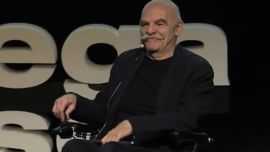Latin American nations are preparing a joint declaration expressing concern over rising tension between the US and Venezuela, according to Chile’s top diplomat.
Members of the Community of Latin American and Caribbean States, known as CELAC and currently led by Colombia, held a virtual meeting, and is finalising a statement emphasising the need for peace, Foreign Affairs Minister Alberto van Klaveren told reporters on Wednesday.
US President Donald Trump said Tuesday that the US military killed 11 “terrorists” when it targeted a boat allegedly carrying drugs from Venezuela in international waters.
Venezuela's Interior Minister Diosdado Cabello accused Washington of committing extrajudicial killings, saying "they murdered 11 people without due process."
“A military presence in that area worries us,” van Klaveren said the next day.
“Everything that implies a source of tension in our region worries us. Chile is a supporter of peace and international law,” van Klaveren said. “We are organising a common stance with other countries in Latin America to express our position.”
The Trump administration’s increasingly confrontational approach in Latin America is aggravating underlying divisions in a region that is struggling to combat organised crime.
Ecuador, among others, is seeking to reinforce its alliance with Washington with a deal to accept hundreds of third-party deportees from the US in exchange for security aid. Other countries in the region are wary. Defence Secretary Pete Hegseth said Wednesday that the US won’t stop at “just this strike.”
Organised crime is a serious problem in Latin America, and the best way to fight it is through joint action with different countries in the region, van Klaveren said, adding that Chile is committed to multilateralism.
Colombia’s Foreign Ministry didn’t immediately reply to a request for comment.
Anti-crime push
US Secretary of State Marco Rubio on Thursday promised security aid to Ecuador and announced terrorist designations as he vowed to ramp up Washington’s regional fight against criminals.
Ecuador's President Daniel Noboa, an emerging Trump ally, has deployed troops to combat violence that has transformed the country from one of Latin America's safest to one of its most dangerous.
Rubio, meeting with Noboa in the centuries-old palace in Quito's old city, said the United States would provide nearly US$20 million in security aid including six million in drones.
He also said that the United States was designating two gangs, Los Lobos and Los Choneros, as foreign terrorist organisations – putting them directly into US crosshairs.
Rubio told reporters that he was helping Ecuador to "wage war against these vicious animals, these terrorists."
Speaking of Trump's push against criminal groups, Rubio said, "This administration is confronting it like it's never been confronted before."
Venezuela boat strike
The deadly strike on the alleged drug-smuggling boat marks a significant escalation from law enforcement to military action against cartels that his administration has branded as terror groups.
Video footage posted by Trump on social media Tuesday showed a multi-engine speedboat with several people aboard bouncing across the waves – but rather than being stopped and boarded, the vessel is suddenly engulfed in an inferno.
The US president said 11 members of the Tren de Aragua gang were killed in the strike, which should "serve as notice to anybody even thinking about bringing drugs into the United States of America."
Ryan Berg, director of the Americas Programme at the Center for Strategic and International Studies, said the strike "demonstrates a change in the rules of engagement."
"There is no longer US Coast Guard boarding of vessels; there is an approach far more similar to how the United States deals with pirates in the Gulf region, or terrorists in the Sahel," he said.
The United States – which has a long history of carrying out strikes against suspected militants without due process – designated Venezuela's Tren de Aragua, Mexico's Sinaloa Cartel and several other drug trafficking organizations as terror groups earlier this year.
The strike on the boat comes at a time of soaring tensions between the United States and Venezuela over the deployment of US warships in the region that Washington says are to combat trafficking but which Caracas views as a threat.
The United States alleges that leftist Venezuelan leader Nicolas Maduro heads a cocaine- trafficking cartel and recently doubled its bounty to US$50 million in exchange for his capture to face drug charges.
Rubio on Thursday denounced Venezuela’s leader Maduro, who was indicted in the United States, and again threatened more strikes.
Maduro is a "fugitive of American justice," Rubio said.
"We are not just going to hunt for drug-dealers with the little fast boats."
– TIMES/AFP/BLOOMBERG

























Comments